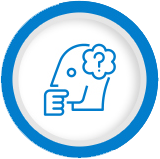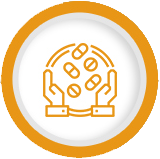Drug & Alcohol Detox with Dual Diagnosis
When you have a mental disorder, such as depression, an anxiety disorder, Post Traumatic Stress Disorder or Schizophrenia, it does not mean you will develop other co-occurring disorders. However, research does suggest a pre-existing mental disorder does increase the probability of a dual diagnosis.
With a dual diagnosis, the symptoms of a mental illness can adversely affect the progress of your addiction recovery. Your mental and emotional well-being are key to you going through the detox process successfully. Your detox process will be carefully planned, considering any symptoms of a mental disorder that may make the detox stage harder.
Facilities that specialise in co-occurring mental disorders have treatment plans that include therapies which treat you as a ‘whole’ person, understanding your individual metal and emotional needs.


Withdrawal & Detoxification
Withdrawal syndrome refers to the group of signs and symptoms that result from the sudden removal of, or an accelerated decrease in, your usual consumption of a psychoactive substance. Repeated or prolonged use and abuse of drugs and alcohol causes the pleasure centres of the brain to stop producing dopamine and to rely on artificial stimulation. When you experience withdrawal symptoms you are feeling the physical, mental and emotional impact of our brain and body being out of balance.
What is Withdrawal?
Withdrawal syndrome refers to the group of signs and symptoms that result from the sudden removal of, or an accelerated decrease in, your usual consumption of a psychoactive substance. Repeated or prolonged use and abuse of drugs and alcohol causes the pleasure centres of the brain to stop producing dopamine and to rely on artificial stimulation. When you experience withdrawal symptoms you are feeling the physical, mental and emotional impact of our brain and body being out of balance. Therapies such as cognitive behavi
How Long does Withdrawal Last For?
The severity and duration of withdrawal symptoms can be very different, and dependent on the type of drug you were using, your level of dependence and history of use, and your physiology. Withdrawal onset can be anywhere from a few hours to several days following your cessation of drug or alcohol consumption. Physical symptoms tend to last a few days, but psychological effects, including anxiety and depression can persist for much longer.
Effects of Withdrawal
You may experience the following symptoms:
- Pain: in the joints and muscles
- Whole body: excessive fatigue, loss of appetite, hunger, clammy skin, lethargy, night sweats, restlessness, feeling cold, shakiness, craving, or sweating
- Gastrointestinal: nausea, flatulence, gagging, vomiting, or stomach cramps
- Behavioural: crying, agitation, irritability, excitability, or self-harm
- Psychological: delirium, hallucination, paranoia, depression, or severe anxiety
- Sleep: nightmares, sleepiness, insomnia, or sleeping difficulty
- Cognitive: disorientation, racing thoughts, mental confusion, or slowness in activity
- Mood: feeling detached from self, boredom, loss of pleasure or interest in formerly enjoyed activities, anxiety, or nervousness
- Nasal: runny or congested nose
- Eyes: watery eyes or dilated pupils
- Common: sensitivity to pain, seizures, teeth chattering, slurred speech, trembling, tremor,tingling feet, or weakness
- none Easy
- none Confidential
- none Lifetime Support
Detox Timeline
Detox processes are different for everyone and for different drugs. Below is an outline of what the timeline for a heavy drinker may look like.
First 12 hours- Heavy drinkers usually experience tremors within the first few hours following their last drink. Some symptoms that you may encounter during the first 12 hours include irritability, sweating, rapid heartbeat, nausea, vomiting, high blood pressure, and insomnia
Days 1-2- After 24 to 48 hours since the last drink, the symptoms peak and are at their most severe. They may include night terrors, hallucinations, seizures, and panic attacks.
Days 3-5- The growing feelings of shakiness, nervousness, and mood swings can continue for a week after the last drink. You may also experience delirium tremens during this period.
Days 6- After detox, a few former heavy drinkers experience extended effects of withdrawal. Psychological symptoms are likely to persist. These include irritability, mood swings, changing levels of energy, anxiety, and trouble sleeping. The symptoms come in waves and could last for several months since the last drink.


How does Detox Work?
Detoxification is an entirely natural process that the body uses to remove waste products and toxins that have accumulated through alcohol or drug use and abuse. Your alcohol or drug detox stage may include medication, counselling, and round the clock medical observation.
Alcohol detoxification is a preparation step for a more extended addiction treatment plan. Detoxification can be conducted at both inpatient and outpatient facilities, although those with a dual diagnosis or long history of addiction are normally treated on an inpatient basis, with constant observation by medical practitioners.
The alcohol and drug detox process usually Involves three stages:
Intake. You are assessed by medical team who perform a comprehensive drug, medical, and psychiatric history analysis so that we can fully understand your addiction and any co-occurring mental disorders.
Medication. A lot of detoxification plans use medications to minimise withdrawal symptoms and help you cope with other mental disorder symptoms that are worsened by the challenge of the detoxification stage.
Stabilisation. You are introduced to therapies that help you to develop new mental frameworks for addiction, mental disorders, your beliefs, and for guiding principles for life.
What Are the Benefits of Detox?
Detox provides the body with a chance to clear itself from alcohol and drugs. The physical symptoms of withdrawal in the detox stage highlight how your central nervous system has begun to rely on your substance use.
What happens during detox?
During detox, your body begins to adapt to a new balance without drugs or alcohol and you may withdrawal symptoms. During withdrawal, your brain craves the familiar substance, whether stimulants, opiates, anti-psychotic drugs or inhalants. When the craving is not satisfied, your body may have sudden violent reactions. This is the reason it is not generally advisable for you to attempt alcohol or drug detox on your own. During detox, you should be in the company of clinicians and trained addiction professionals who will monitor the changes your body and mental state go through. Detox involves you going though the process, and it can be uncomfortable. We will do what we can to control the unpleasant thoughts and feelings through a carefully designed detox plan, taking into account any co-occurring mental disorders.

The detox timeline for a complete detox varies from one patient to the other. Generally alcohol detoxification lasts for 3 to 5 days, but it can last for a week or even longer. Most drugs have left the system within 5 days, but that is not always the end of the withdrawal symptoms. You need to be prepared for a process of recovery that challenges your resilience and commitment to recovery. The addiction specialists you work with will help you on every step of your addiction recovery.
Does home Detox work?
Home detox can work. Inpatient detox programmes are usually more effective, safer, and more controlled though. The most important variable in detox is your commitment to your rehabilitation process. When withdrawal symptoms are strong it can be hard to resist the temptation to relapse. Having 24-hour medical supervision, and the benefit of medically assisted detoxification, may make the difference for you. It is up to you to consult with addiction specialists and to figure out the best treatment plan for your addiction.
What happens after detox
It is good to look at what happens after detox treatment, and to look at your addiction recovery as a journey you go on. After detox, your body and brain should be drug free, but you are left with the beliefs, triggers and emotional baggage that has been built through your period of addiction. You now need to develop new beliefs and thinking strategies, and addiction therapies play a major role in this process.
Addiction is a devastating illness which can put all your relationships and your career in chaos. To help you recover and enjoy life again, we strive to heal both you and your relationships. Call us now to begin the road to recovery today!
Get Help Immediatley, Call Now!
Rehab
Drug and alcohol rehab programmes can be found in hospitals, outpatient facilities, long-term residential communities, and inpatient treatment centres. Sober living homes (halfway houses) and transitional housing facilities are also available for recovering addicts who want a safe and structured surrounding during and after rehab.
The time you spend in a rehab programme varies from one treatment facility to the other. Intensive rehab programmes usually last around two weeks to 30 days. However, there are long-term residential rehab programmes which last between 90 days to six months.
During rehab for drug and alcohol addiction you may go through therapies like cognitive behavioural therapy, yoga therapy, art therapy, equine therapy, psychotherapy and so on. Your individual and group therapies will be carefully planned to help you develop a new mental make-up that can help you move towards a productive life of sobriety.


Sober Living Homes
After rehab, some people opt to live in sober living homes. These facilities are particularly beneficial if you have an unstable home environment that could be a threat to your sobriety. Sober living homes provide a safe, alcohol and drug-free environment that encourages you to look for help from counsellors and local support groups.
Individual Alcohol Counselling
When you leave rehab, personal counselling continues to be an essential step in recovery. The individual alcohol counselling sessions are usually every week in the immediate period following rehab. We use these sessions to track your recovery progress and ensure you make the necessary adjustments back to a new lifestyle in society and at work.
As your recovery journey continues, you may begin to decrease the frequency of your sessions with the counsellor. However, it’s advisable to regularly visit your therapist to evaluate the goals for and outcomes of your recovery. Some therapists might advise you to call them for assistance if you encounter any persistent triggers or stressors that you struggle with.


Support Groups
Your social network will have a massive impact on your long-term sobriety. If you surround yourself with sober peers, there is a greater chance of maintaining a lifestyle free from drugs and alcohol.
Sobriety support groups, such as Alcoholics Anonymous, Narcotics Anonymous and Cocaine Anonymous are great platforms for you to create new friendships with other people who can understand the challenges you encounter daily. These interactions provide you with the much-required support system in your journey of recovery.
On completing treatment we offer lifetime support for your recovery.
Strict client confidentiality policy is in place.
Simply give us a call and we will guide you through the process.
Frequently Asked Questions
Can you die from withdrawal?
A lot of people think that alcohol and drug withdrawal only cause unpleasant feelings and cannot be life-threatening, but death is possible and deaths do occur. Complications that arise from withdrawal are usually due to a lack of medical supervision in the detox process, or a lack of understanding of co-occurring mental disorders that lead to increased mental instability through the process.
How can alcohol withdrawal cause death?
Two of the clinical symptoms of withdrawal are vomiting and diarrhoea. Persistent diarrhoea and vomiting, if untreated, can cause dehydration, hypernatremia (increased blood sodium level), thus resulting in heart failure. Complications like fatal arrhythmias can also occur. Due to the nature of withdrawal, the prevalence of co-occurring mental disorders with alcoholism, and the mental problems that are associated with withdrawal, it is important that medical and psychiatric practitioners monitor the mental state of patients during withdrawal, as there is an increased risk of suicide for those suffering from substance abuse disorders..
Is it better to have medically supervised detox?
Drug and alcohol detox, when medically supervised, tends to be safer. We recommend that you receive continual monitoring from medical professionals if you are at risk of withdrawal symptoms. Medically supervised detox means medical practitioners can help you through the process with medications that reduce withdrawal symptoms and make the process more comfortable. The controlled environment also removes temptations and triggers, which might be present in outpatient detox, from your immediate environment.
Can alcohol detox cause seizures?
Yes, seizures are one of the symptoms of alcohol withdrawal. Seizures can occur as little as a few hours after alcohol cessation or can take as long as 1 to 2 days after the last drink.
Those with a history of seizures due to pre-existing medical conditions have an increased likelihood of having seizures during alcohol detox. Normal seizure medications are not always effective in the prevention of alcohol withdrawal seizures.
What does drug detox feel like?
The intensity with which your body and mind experiences withdrawal symptoms depends on the period you have had the addiction, the substance abused, your individual physiology and lots of other factors. The severity of the symptoms can, at times, be extremely uncomfortable. Detox is a stage you must accept and pass through on your recovery journey.
What does alcohol detox cost?
The cost of alcohol addiction treatment is different with each detox centre. Some detox programmes are free, such as those available through the NHS. Some exclusive luxury rehabs cost thousands of pounds a day. What is important is that you choose a detox facility that can provide a treatment plan that suits your addiction and can cater to any co-occurring disorders that may present. Addiction treatment centres normally charge between £1500 and £5000 per week. Some insurance providers cover addiction within their policies, so, if you have insurance, find out if you are covered.
Why is alcohol withdrawal dangerous?
There are intense physical, mental and emotional withdrawal symptoms that result from cessation of alcohol. Some of the physical effects can be life-threatening if detox is not carried out in a controlled way. Withdrawal from alcohol can also lead to the development or worsening of mental health problems like depression and/or anxiety.





